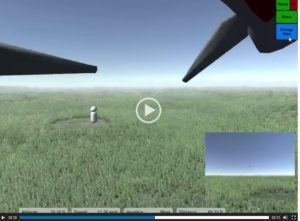
Cobb UAS, a drone services company that helps train and equip public safety organizations, recently announced the release of droneSim Pro – a UAV flight-simulation software package that its creators say will faithfully reproduce real-world physics.
Companies like Cobb UAS already provide classroom and hands-on training; however, Cobb President Jason Hershcopf says that such methods can be inadequate based on space and equipment availability.
“They are part of the solution in drone safety, but the amount of flight time varies and is limited.,” Hershcopf said in a DRONELIFE interview. “However, our simulator allows you to fly a drone on your computer without regard to weather, flight restrictions, or costly drone damage,” he added – “droneSim Pro allows pilots to fly whenever they want, without being tethered to their drone.”
Hershcopf and company developed droneSim Pro using real-world physics in order to create a realistic flying experience. While creating the software, the developers were able to fly real drones to better understand the mechanics of flight.
“The lead developer had never flown a drone before, but after spending many hours working with the simulator, he took off and was easily able to fly the drone,” Hershcopf recalls.
The droneSim Pro is designed to form only one part of the total training curriculum for drone clients, the company stated. Cobb UAS developed droneSim Pro as part of the training curriculum for its clients. The company currently offers open field and obstacle scenarios for learning basic flight controls and maneuverability. The real application payoff is in flying in reality-based scenarios — especially for pilots in the public safety arena in which drones can be an invaluable asset in situational awareness.
“Fire chiefs and officers seem to have a general understanding of what drones can do, but when we show them just how instrumental drones can be, it is a game changer,” Hershcopf said. “Now, with droneSim Pro, they have the ability to train their pilots to fly the way they would during an actual fire. Sure, they could wait for a real fire incident to learn and practice, but for many jurisdictions, those are few and far between,” he added.
“A real incident is not the best time to have initial on-the-job training.”
Jason is a longstanding contributor to DroneLife with an avid interest in all things tech. He focuses on anti-drone technologies and the public safety sector; police, fire, and search and rescue.
Beginning his career as a journalist in 1996, Jason has since written and edited thousands of engaging news articles, blog posts, press releases and online content.
Email Jason
TWITTER:@JasonPReagan
Subscribe to DroneLife here.